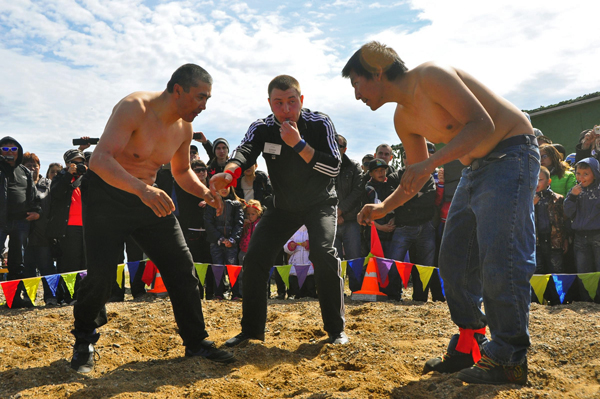
An Alaska Native family recently traveled to Russia’s Far East to take part in a gathering of indigenous people from seven nations throughout the circumpolar north. The three participated in Native games, music and the celebration of traditional culture in a tiny coastal village along the Bering Sea.
On a recent summer Saturday, Alaska Native Elder Kooper Piscoya joined a wild, cheering crowd to watch teams of men and women row giant, handmade walrus skin boats across the flat water of a protected bay off the Bering Sea coast. He says he once got to ride in a boat just like one of these when he was a kid, growing up in Nome.
“A guy named Dominic would bring the tours down to the Snake River and take them on boats rides in the skin boat all the time,” he remembers. “That was pretty neat to see. A lot of tourists would come down and hop in the skin boat and go for a skin boat ride.”
Piscoya was in the tiny village of Novoye Chaplino in Russia’s Chukotka Region to see his children, 22-year-old Megan and 19-year-old Andy compete in the skin boat races as well as other events at the inaugural Beringia Arctic Games. He says skin boat races haven’t happened near Nome since his grandfather’s time.
“Watching these two Megan and Andy skin boat race it was like a great feeling to see them do something like my grandpa did.” He smiles, boradly. “It was awesome. I was so happy!”
This was the second time Megan and Andy have visited Chukotka. In 2011, they went to a small town called Lavrentiya, more than 100 miles north of Novoye Chaplino. That’s where they met their Russian relatives.
“When we went there, it was two days after we came and Lavrentiya and Megan was going upstairs and they stopped her,” explains Andy. “They had a translator and said ‘we’re relatives,’ and all of that. We have a cousin. He’s probably 20 years old.”
“We went over to his place and had dinner a couple of times,” Megan remembers. “and his mom, our Auntie, made us dinner and had us just lounge around the house and it was rally nice and she really loved it even though we couldn’t speak to each other,” she says.
Very little English is spoken in Chukotka, but that doesn’t seem to phase either of the Piscoya kids. Andy says this year, he reconnected with some of the friends he first made three years ago.
“I recognized our old captain of our row boat,” he smiles. “I looked towards him and he looked at me and he got a bog smile on his face and walked over and shook his hand and I hung out with him and drank some tea.”
Andy had a successful run in a wrestling match during this year’s games. He came to within two points of beating a well-known Russian musher from the region. His sister Megan was also successful in competition. She finished second overall in the one arm reach, a game of agility and precision.
“I actually haven’t done that event since high school,” she laughs. “I was really surprised I was able to do it too.” Dad, Kooper cuts in. “I was so happy to watch her compete and Andy in his wrestling. I was overjoyed.”
Kooper Piscoya wasn’t able to take part in the games for health reasons, but he says he used to play them all the time. “I did it a long time ago in high school. I did the seal hop, kneel jumps, one foot high kick, stick pull…,” he said, listing off his favorites.
It’s not often that families like the Piscoyas’ are able to travel to places as remote as Chukotka. A visa can cost up to roughly $400 dollars. Visitors – even Russian citizens – need a formal invitation from the government and that’s on top of the cost to charter a flight from Nome to Chukotka’s capital, Anadyr. Kooper Piscoya almost didn’t make the trip this summer, but daughter Megan says she was relentless.
“I asked him so many times. ‘How come you don’t want go? How come you don’t want to go?’ He was in the kitchen and I was in the living room and I texted him after I had asked him in person and he was like ‘No, I don’t need to go. ‘What’s in Russia?’ I guess he finally found out what’s in Russia,” she said, smiling.
This year’s Beringia Arctic Games were so popular among the visitors and locals who took part, that they are likely to happen again next year. Organizers have announced that the Governor of the Chukotka Region has agreed to allow the games to take place in the village of Lorino in 2015.




